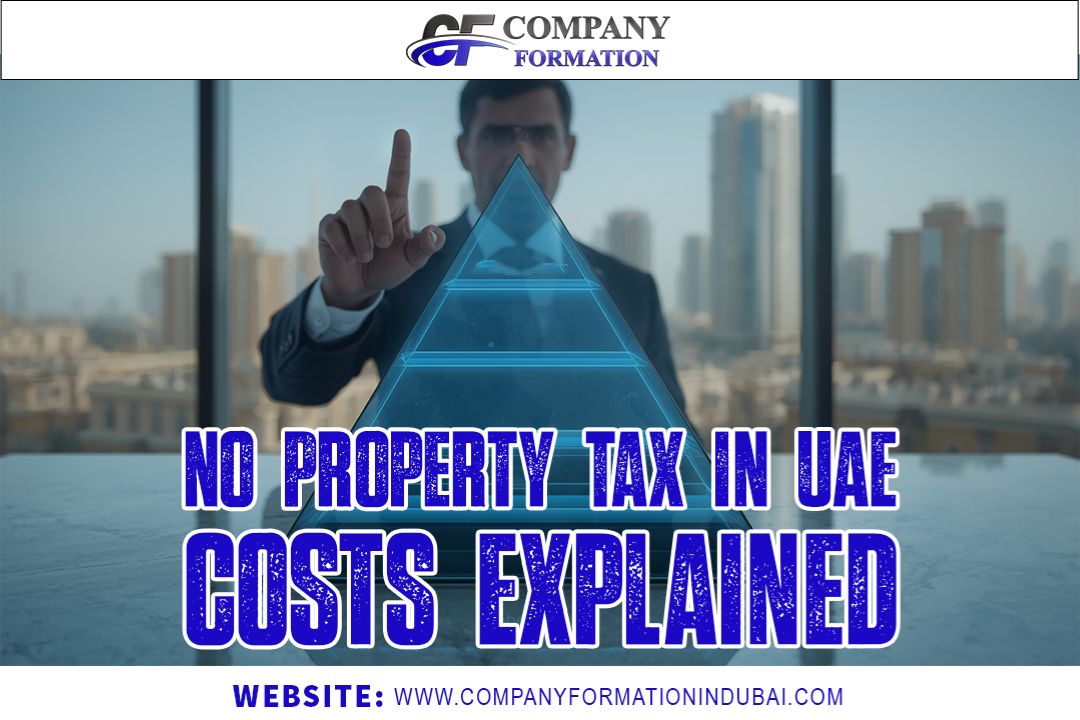Property Tax in the UAE | A Complete Guide for Investors and Homeowners
The UAE does not impose an annual property tax on real estate, making it a magnet for investors and homeowners. Instead, you’ll encounter one-time fees like Dubai Land Department (DLD) fees, transfer fees, and VAT on commercial property. For foreigners, including Indian citizens, and natural persons, understanding these costs is key to navigating the UAE real estate market. This guide breaks down everything you need to know, from no annual property tax benefits to corporate tax implications and free zone property tax advantages.
Overview of Property Tax in the UAE
The UAE real estate market is a hotspot for investors and homeowners due to its tax-free environment. Unlike many countries, the UAE imposes no annual property tax, which means you won’t face recurring taxes on owning a home or investment property. Instead, you’ll deal with one-time fees like transfer fees, registration fees, and VAT on commercial property. This guide explains these costs, corporate tax implications, and benefits for foreigners and natural persons.
Why Is the UAE Tax-Friendly?
The UAE’s investor-friendly market skips traditional property taxes to boost real estate investment. For example, in the US, property taxes range from 0.5% to 3% of a property’s value annually, but in the UAE, you pay nothing yearly. This saves you thousands over time, especially in high-value areas like Dubai Marina or Palm Jumeirah. The Federal Tax Authority (FTA) and Dubai Land Department (DLD) ensure a transparent system with clear fees, making budgeting easier.
Key Entities in UAE Real Estate Taxation
Several entities shape the UAE tax system for real estate:
- Federal Tax Authority (FTA): Oversees VAT and corporate tax compliance.
- Dubai Land Department (DLD): Manages property transfer and registration fees.
- RERA: Sets service charges based on property size and amenities.
- Free Zones (DIFC, DMCC, ADGM): Offer free zone property tax benefits.
- Municipalities: Collect housing fees (e.g., 5% of rent in Dubai).
These entities ensure a streamlined real estate market with minimal tax burdens.
Types of Property-Related Fees in the UAE
While there’s no property tax in the UAE, you’ll encounter fees when buying, owning, or renting property. These costs vary by emirate, with Dubai real estate and Abu Dhabi real estate having distinct structures.
Dubai Land Department (DLD) Fees
The DLD charges a 4% transfer fee on the property’s purchase price, typically split between buyer and seller. For a AED 2 million property, that’s AED 80,000. This fee registers the title deed and ensures legal ownership.
Registration and Transfer Fees
Registration Fees:
- AED 2,000 + 5% VAT for properties under AED 500,000.
- AED 4,000 + 5% VAT for properties over AED 500,000.
- Oqood registration for off-plan properties: AED 5,250.
Transfer Fees: Included in the 4% DLD fee, paid at ownership transfer.
Tawtheeq Fees (Abu Dhabi): Vary by rental value, typically AED 1,000–2,000.
These fees are one-time costs, unlike recurring property taxes elsewhere.
Service Charges and Maintenance Fees
Service charges cover communal upkeep in freehold areas like Business Bay. Rates vary (AED 10–30 per sq. ft.) based on amenities (e.g., pools, security). For a 1,000 sq. ft. apartment, expect AED 10,000–30,000 yearly. RERA regulates these charges for transparency.
Mortgage-Related Costs
If you finance your purchase, expect:
- Mortgage Registration Fee: 0.25% of the loan + AED 290.
- Property Valuation Fee: AED 2,500–3,500 + 5% VAT.
- No Objection Certificate (NOC) Fee: AED 500–5,000 for properties with existing mortgages.
These costs apply to freehold properties and leasehold agreements.
Miscellaneous Costs
- Agent Commission: 2% of purchase price + 5% VAT.
- Legal Fees: AED 5,000–10,000 for contract reviews.
- DEWA Fees: AED 2,000 (apartments) or AED 4,000 (villas) for utility connections.
- Moving Costs: Vary based on your needs.
These expenses ensure a smooth property transfer process.
Value-Added Tax (VAT) on Property in the UAE
Introduced in 2018, VAT at 5% applies to certain real estate transactions, impacting commercial properties and services.
VAT on Residential Properties
The first sale of new residential buildings (within three years of completion) is zero-rated, meaning no VAT is charged, but developers can recover input tax. Subsequent sales or leases are exempt, so buyers and tenants face no VAT on apartments, villas, or residential lease fees.
VAT on Commercial Properties
Commercial property sales and leases (e.g., offices, showrooms) incur a 5% VAT. For a AED 100,000 annual lease, that’s AED 5,000 in tax. Tenants registered with the FTA can recover this through tax returns, reducing costs.
VAT Compliance for Landlords
Landlords earning over AED 375,000 annually from rental income must register for VAT with the FTA. This applies to commercial tenants or mixed-use properties. Non-compliance risks penalties, so consult a UAE PRO services expert for guidance.
Corporate Tax and Real Estate Investment
Since June 2023, the UAE imposes a 9% corporate tax on business profits above AED 375,000. For real estate investment, natural persons enjoy specific exemptions.
Real Estate Investment Exclusion for Natural Persons
Under Cabinet Decision No. 49 of 2023, Real Estate Investment income (e.g., rental income, property sales) is excluded from corporate tax if:
- It involves selling, leasing, or sub-leasing land or real estate property.
- It’s not conducted through a licensing authority (e.g., Dubai Department of Economy and Tourism).
- Examples: Renting residential apartments via Ejari (not a license) or selling a personal residence.
For instance, if I rent out my Dubai apartment for AED 80,000 yearly without a license, that income is tax-free. But managing a holiday home with a license counts as a business, subject to corporate tax if turnover exceeds AED 1 million.
Corporate Tax for Property Businesses
If you run a sole proprietorship or company (e.g., setting up a company in Dubai) with a license for property management, rental income is taxable if turnover exceeds AED 1 million. For example, a AED 600,000 profit yields a AED 20,250 tax (9% on AED 225,000 above the threshold).
Apportionment of Expenditure
Shared costs (e.g., utilities for holiday homes and residential rentals) must be apportioned fairly. I once split costs for my properties based on property value, ensuring only business-related expenses were deducted for taxable income. Methods include headcount, floor space, or usage, per Ministerial Decision No. 114 of 2023.
Property Tax for Foreigners in the UAE
Foreigners, including Indian citizens, can own freehold properties in designated areas like Dubai Marina. Here’s what you need to know.
Property Tax in Dubai for Foreigners
Property tax in Dubai for foreigners mirrors that for residents: no annual property tax. You’ll pay DLD fees (4%), agent commissions (2%), and VAT on commercial properties. For example, buying a AED 1 million apartment incurs a AED 40,000 DLD fee.
Property Tax in the UAE for Indian Citizens
Property tax in the UAE for Indian citizens follows the same rules. However, double taxation treaties prevent tax on rental income or capital gains in India if declared in the UAE. Consult a business setup expert in Dubai to ensure compliance.
Income Tax and Capital Gains Tax for Foreigners
The UAE has no income tax or capital gains tax UAE for individuals, a huge draw for foreign investors. Profits from selling a property (e.g., AED 400,000 gain on a AED 3.4 million sale) are tax-free, unlike in countries with 15–30% capital gains taxes.
Free Zone Property Tax Benefits
Free zones like DIFC, DMCC, and ADGM offer unique tax advantages for real estate investment.
Tax Advantages in DIFC, DMCC, and ADGM
Free zone property tax benefits include exemptions from VAT on certain transactions and relaxed corporate tax rules. For example, commercial property leases in designated zones may be outside VAT scope, saving 5% on costs.
Setting Up a Company in Dubai Free Zones
Setting up a company in Dubai free zones simplifies business registration in Dubai and bank account opening in Dubai. It’s ideal for property businesses, as you may avoid corporate tax on Real Estate Investment income if unlicensed. UAE PRO services can streamline the process, and Golden Visa UAE eligibility may apply for investors.
How to Calculate Property Costs in the UAE
Estimating costs is crucial for budgeting in the UAE real estate market.
Using a Property Tax in the UAE Calculator
A property tax in the UAE calculator (or cost calculator) estimates fees like:
- DLD fee: 4% of purchase price.
- Registration fee: AED 2,000–4,000 + 5% VAT.
- Agent commission: 2% + 5% VAT.
- Mortgage fees: 0.25% of loan + AED 290.
Online tools from DLD or real estate platforms can help. For a AED 2 million property, expect ~AED 90,000 in fees.
Step-by-Step Cost Estimation
- Determine Property Value: E.g., AED 2 million.
- Calculate DLD Fee: 4% = AED 80,000.
- Add Registration Fee: AED 4,000 + AED 200 VAT.
- Include Agent Commission: 2% = AED 40,000 + AED 2,000 VAT.
- Factor Mortgage Costs: E.g., 0.25% of AED 1 million loan = AED 2,500 + AED 290.
- Estimate Annual Service Charges: AED 10,000–30,000.
This ensures investor confidence with transparent budgeting.
Common Myths About UAE Property Taxes
Misconceptions can confuse investors. Let’s clear them up.
Myth 1: Dubai Has Zero Taxes on Real Estate
While there’s no annual property tax, VAT on commercial property (5%) and DLD fees apply. These are one-time or transactional costs, not recurring taxes.
Myth 2: No VAT Applies to Any Property
VAT applies to commercial property sales and leases (5%) and services like brokerage fees. Residential properties are exempt after the first sale.
FAQs About Property Tax in the UAE
Q1: Is there property tax in Dubai?
No, Dubai has no annual property tax. You pay one-time DLD fees (4%), registration fees, and VAT on commercial properties.
Q2: What is the property tax in the UAE for foreigners?
Foreigners face no property tax but pay transfer fees (4%), agent commissions (2%), and VAT on commercial properties.
Q3: How do I calculate property costs in Dubai?
Use a Dubai property tax calculator to estimate DLD fees, registration fees, mortgage costs, and service charges. For a AED 1 million property, expect ~AED 45,000 in fees.
Q4: Is there capital gains tax in the UAE?
No, the UAE imposes no capital gains tax, making it ideal for real estate investment.
Q5: How does corporate tax affect property investors?
Natural persons earning Real Estate Investment income without a license are exempt from corporate tax. Businesses with turnover above AED 1 million pay 9% on profits.
Q6: Can I pay DLD fees online?
Yes, DLD offers online payment portals for transfer fees and registration fees. Check the official DLD website for details.
Q7: What are the penalties for late property registration?
Late DLD registration may incur fines (e.g., AED 500–2,000), depending on the emirate. Contact DLD for specifics.
Q8: What are the tax benefits of free zone property ownership?
Free zones like DIFC and DMCC offer VAT exemptions on certain transactions and relaxed corporate tax rules for unlicensed activities.
Conclusion: Navigating the UAE Real Estate Market
The UAE real estate market offers unmatched opportunities due to no annual property tax, no capital gains tax, and a tax-free environment for natural persons. Whether you’re a foreigner, Indian citizen, or local investor, understanding DLD fees, VAT on property, and corporate tax exclusions is crucial. From Dubai Marina to free zones like DMCC, the UAE’s investor-friendly market ensures high returns with low tax burdens. For personalized guidance, consider UAE PRO services to streamline business registration in Dubai or secure a Golden Visa UAE. Start planning your investment today to maximize rental income and property portfolio growth.




